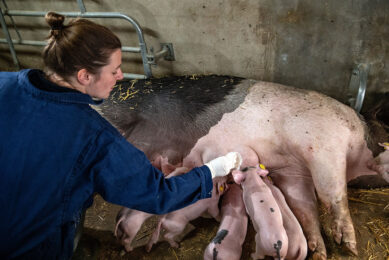Covid-19: Tönnies slaughterhouse can ship again to China

Germany’s largest slaughterhouse in Rheda-Wiedenbrück, owned by Tönnies, has received the thumbs-up to resume exports of pig meat to China. Trade had been suspended due to Covid-19 restrictions.
The Tönnies slaughterhouse received permission to do so on August 17. About 4 weeks ago, the abattoir resumed operations after having been shut down for a full month due to a Covid-19 outbreak amongst the staff. The Chinese authorities now stated that the measures are sufficient to allow trade again. The measures include the testing of staff various times per week.
Slaughtering 25,000 pigs/day
The plant in Rheda-Wiedenbrück, in the state North Rhine Westphalia, normally slaughters roughly 25,000 pigs/day. Levels are now back at 17,000/day and staff is operating in 2 shifts. During the suspension, Tönnies could continue to export from other plants throughout Germany, e.g. in Weiβenfels and Sögel.
As a result of the Covid-19 crisis, Tönnies has decided to start recruiting its own staff again. Until recently, the company hired its – mostly Eastern European – staff through employment agencies. This type of construction will soon be phased out in Germany’s meat industry.
Slaughter backlog on finisher pig farms
The closure of the plant in Rheda-Wiedenbrück led to a slaughter backlog amongst Germany’s finisher pig farms. In order to accommodate pig producers who had to keep their pigs on-farm longer, the optimum slaughter weight range was temporarily increased by 7 kg – a measure that wasn’t going down well with producers who had not been experiencing any problems. The optimum range is currently already back at normal levels, between 86-105 kg.
Coronavirus can spread over 8m at cutting floor
Circumstances at a cutting floor can help SARS-CoV-2 spread over distances over 8 metres. That has become clear in a case study at Germany’s largest slaughterhouse, owned by Tönnies.
Also in the Netherlands, various meatpackers faced an export ban, including slaughterhouses by Vion in Boxtel and Groenlo, Van Rooi Meat in Helmond and Westfort. They are still not allowed to resume exports to China, nor is it known when that might happen.
Danish Crown slaughter plant in Ringsted
Elsewhere in Europe, various plants also faced restrictions due to Covid-19. Earlier in August, a Danish Crown slaughterhouse in Ringsted had to be closed temporarily when 163 employees had tested positive. The slaughterhouse, which is at 50 km from the capital Copenhagen, employs 900 staff.
Danish media report that Danish Crown says things are going in the right direction and that the plant is planning to reopen on Friday, August 21. All employees that tested positive had to go into self-isolation.
Covid-19 Up-date
What impact is the pandemic having on the global pig sector and how are they dealing with it.
Belgium: outbreak at meatpacker Westvlees
Also in Belgium, recently an outbreak was documented at a slaughterplant by Westvlees in the city Westrozebeke. When all employees were tested, 94 employees turned out to be positive for Covid-19. In total, the plant has roughly 850 employees.
Initial 260 staff members, mostly from the cutting floor, were tested which revealed 74 infections; further testing of 557 more employees only yielded 20 more infections, reason for the authorities to state that things are moving in the right direction here as well.
The plant slaughters annually about 1.4 million pigs. Complete temporary closure of the entire facility was already deemed to be disproportionate and with the latest figures, the plant can be in operation.
Other Covid-19 cases in Europe
News agency Reuters reported that meat processing plants in Ireland and Greece have also reported clusters of new infections this month.
 Beheer
Beheer








 WP Admin
WP Admin  Bewerk bericht
Bewerk bericht